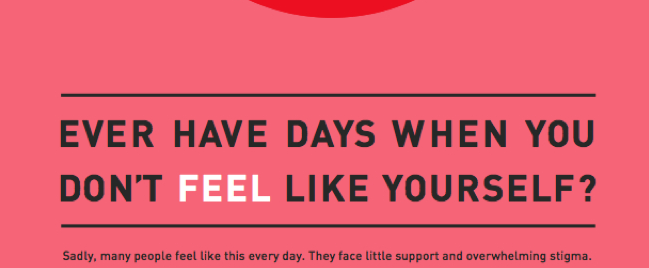RETHINK MENTAL ILLNESS
- font size decrease font size increase font size
 Like physical health, we all have mental health. Both change throughout our lives. And, like our bodies, our minds can become unwell.
Like physical health, we all have mental health. Both change throughout our lives. And, like our bodies, our minds can become unwell.
A mental illness is defined as a condition that impacts a person's thinking, feeling or mood and may affect his or her ability to relate to others and function on a daily basis. The illness has multiple, interlinking causes. Genetics, environment and lifestyle combine to influence whether someone develops a mental health condition. A stressful job or home life makes some people more susceptible, as do traumatic life events like being the victim of a crime.
“One in four of us will be affected by mental illness in any year”
 Mental illness is more common than you think. Maybe it’s your mother; maybe it’s your best friend; maybe it’s your teacher or guidance counselor or dance instructor. Maybe it’s you. The effects are as real as a broken arm, even though there isn’t a sling or plaster cast to show for it.
Mental illness is more common than you think. Maybe it’s your mother; maybe it’s your best friend; maybe it’s your teacher or guidance counselor or dance instructor. Maybe it’s you. The effects are as real as a broken arm, even though there isn’t a sling or plaster cast to show for it.
The more common types include:
• Anxiety disorders:
People with anxiety disorders respond to certain objects or situations with fear and dread, as well as with physical signs of anxiety or panic, such as a rapid heartbeat and sweating. A diagnosis is made if the person's response is not appropriate for the situation, if the person cannot control the response, or if the anxiety interferes with normal functioning. Anxiety disorders include generalized anxiety disorder, panic disorder, social anxiety disorder, and specific phobias.
• Mood disorders:
These disorders, also called affective disorders, involve persistent feelings of sadness or periods of feeling overly happy, or fluctuations from extreme happiness to extreme sadness. The most common mood disorders are depression, bipolar disorder, and cyclothymic disorder.
• Psychotic disorders:
involve distorted awareness and thinking. Two of the most common symptoms of psychotic disorders are hallucinations -- the experience of images or sounds that are not real, such as hearing voices -- and delusions, which are false fixed beliefs that the ill person accepts as true, despite evidence to the contrary. Schizophrenia is an example of a psychotic disorder.
• Eating disorders:
involve extreme emotions, attitudes, and behaviors involving weight and food. Anorexia nervosa, bulimia nervosa, and binge eating disorder are the most common eating disorders.
• Impulse control and addiction disorders:
Such people are unable to resist urges, or impulses, to perform acts that could be harmful to themselves or others. Pyromania (starting fires), kleptomania (stealing), and compulsive gambling are examples of impulse control disorders. Alcohol and drug are common objects of addictions. Often, people with these disorders become so involved with the objects of their addiction that they begin to ignore responsibilities and relationships.
• Personality disorders:
People with personality disorders have extreme and inflexible personality traits that are distressing to the person and/or cause problems in work, school, or social relationships. In addition, the person's patterns of thinking and behavior significantly differ from the expectations of society and are so rigid that they interfere with the person's normal functioning. Examples include antisocial personality disorder, obsessive-compulsive personality disorder, and paranoid personality disorder.
• Obsessive-compulsive disorder (OCD):
Such people are plagued by constant thoughts or fears that cause them to perform certain rituals or routines. The disturbing thoughts are called obsessions, and the rituals are called compulsions. An example is a person with an unreasonable fear of germs who constantly washes his or her hands.
• Post-traumatic stress disorder (PTSD):
This is a condition that can develop following a traumatic and/or terrifying event, such as a sexual or physical assault, the unexpected death of a loved one, or a natural disaster. People with PTSD often have lasting and frightening thoughts and memories of the event, and tend to be emotionally numb.
Recovery, including meaningful roles in social life, school and work, is possible, especially when you start treatment early and play a strong role in your own recovery process.
Recovery and Wellness
“50% of mental health conditions begin by age 14 and 75% of mental health conditions develop by age 24”
The attitudes people have towards those of us with mental health problems mean it is harder for them to work, make friends and live a normal life. Many people say that being discriminated against in work and social situations can be a bigger burden than the illness itself.
• People become isolated
• They are excluded from everyday activities
• It is harder to get or keep a job
• People can be reluctant to seek help, which makes recovery slower and more difficult
• Their physical health is affected.
Simple, everyday ways to support someone who has a mental health problem
“You don’t have to be an expert to talk about mental health.”
The way family, friends, neighbours and colleagues behave can have a big impact on the lives of people with mental health problems. Small things can make a big difference – like being there to listen, keeping in touch and reminding the other person that you care.
You are their first shrink:
If you know someone has been unwell, don’t be afraid to ask how they are. They might want to talk about it, they might not. But just letting them know they don’t have to avoid the issue with you is helpful.
Avoid clichés:
Phrases like ‘Cheer up’, ‘I’m sure it’ll pass’ and ‘Pull yourself together’ won’t help. Try to be open minded and non-judgmental. You won't always understand what's going on for the other person, but lending an ear is the important part.
Mind the body language:
Try to be relaxed and open. It probably goes without saying that a gaping mouth, regular clock watching or looking uncomfortable won’t go unnoticed.
Ask how you can help:
People will want support at different times in different ways, so ask how you can help.
Don’t just talk about mental health:
Keep in mind that having a mental health problem is just one part of the person. People don't want to be defined by their mental health problem so keep talking about the things you always talked about. Just spending time with the person lets them know you care and can help you understand what they're going through.
Don’t avoid the issue:
If someone comes to you to talk, try not to brush them off. Asking for support can be a hard step to take.
Give them time:
Some people might prefer a text or email rather than talking on the phone or face-to-face. This means they can get back to you when they feel ready. What’s important is that they know you’ll be there when they’re ready to get in touch.
Find out more:
If you think you might feel awkward or uncomfortable, you could find out more about mental illness. If you think it would help, you could also find about other help that’s available.
“the value of supporting friends, family & colleagues”
It’s quite likely that one day you, one of your friends, colleagues or family members will experience a mental health problem.

